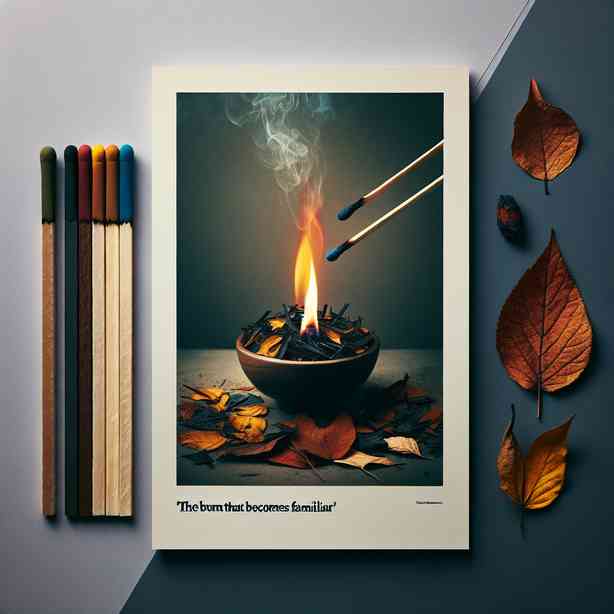
The Burn That Becomes Familiar
In the landscape of human experience, there exists a phenomenon that many can relate to—the burn that becomes familiar. This concept transcends physical sensations, touching upon emotional or psychological experiences that deeply resonate with individuals. It embodies the dual nature of pain, discomfort, and adaptation. Understanding this concept requires delving into the various dimensions in which this “burn” manifests and how it shapes our lives over time.
Initially, one might wonder what is meant by “the burn.” At its core, this refers to the sensation of pain, discomfort, or distress that often serves as a catalyst for change or reflection. While the term may evoke thoughts of physical burns, it is equally applicable to emotional and situational challenges that people encounter. Just as a physical burn signals that something is wrong, emotional burns—such as grief, heartbreak, or stress—also convey messages about our internal struggles and coping mechanisms.
As individuals, we typically experience discomfort in various forms throughout our lives. Each encounter with such “burns” can trigger a range of responses, from immediate survival instincts to deeper introspection. For instance, consider the emotional burn individuals feel after a breakup. Initially, this pain can feel insurmountable, overwhelming the individual with grief. However, as time progresses, many find that the burn evolves into something familiar. They come to recognize patterns in their emotional responses and begin to anticipate feelings of sadness during certain anniversaries or moments, ultimately learning to navigate these emotional landscapes with a degree of familiarity.
Moreover, the familiarity with emotional burns can serve as a double-edged sword. While it fosters resilience and allows for adaptation, it can also lead to complacency. When individuals become accustomed to certain discomforts, they might inadvertently accept situations that are detrimental to their overall well-being. This complacency can manifest in various forms, such as staying in unhealthy relationships, tolerating toxic work environments, or neglecting personal growth. The challenge lies in balancing the understanding of familiar burns with the necessity for personal progress.
Furthermore, familiar burns are not limited to personal experiences; they extend into societal realms as well. Consider how communities react to adversity, such as economic downturns, natural disasters, or social injustices. The initial shock of such events often evokes a profound emotional response, creating a collective burn felt by many. Over time, however, societies can become accustomed to these challenges, developing coping mechanisms and resilience that may inadvertently normalize suffering. This normalization can dull the urgency for change or improvement, causing societal stagnation.
In exploring the complexities of familiar burns, it becomes essential to discuss the role of self-awareness and emotional intelligence. Recognizing when a burn is becoming familiar allows for critical reflection. Individuals can assess whether their emotional landscapes are improving or if they are inadvertently settling into patterns of suffering. The awareness of emotional responses empowers individuals to make informed choices regarding their reactions, relationships, and aspirations, providing a pathway towards personal growth.
Moreover, seeking support plays a pivotal role in navigating familiar burns. Whether through therapy, support groups, or trusted friends, sharing experiences can facilitate healing and understanding. Discussing these familiar burns can break the cycle of isolation and stigma, encouraging individuals to share their stories and learn from one another. In essence, it transforms the burn from a solitary experience into a communal narrative, forging connections and fostering collective healing.
As we navigate through timelines marked by various burns, it’s important to underscore the significance of personal agency. Recognizing the moments when one is faced with a familiar burn equips individuals with the power to choose their reactions. This awareness can motivate change or inspire steps towards self-improvement. While experiencing discomfort can be an inevitable part of life, realizing that one has the ability to reshape one’s narrative is transformational.
Additionally, creativity often emerges from the familiar burns we endure. Many artists, writers, and thinkers draw inspiration from their struggles, using their experiences to forge deeper connections with audiences. The act of creating can be therapeutic, providing an avenue for expressing pain, processing emotions, and ultimately transforming suffering into something meaningful. This transformation exemplifies how the acknowledgment of familiar burns can serve as a catalyst for both personal expression and communal solidarity.
From a broader perspective, the familiar burns we endure can serve as powerful teachers. They offer lessons in patience, resilience, and empathy. Engaging with our own burns—and those of others—opens avenues for profound learning and growth. Each encounter and each lesson shapes our worldview, contributing to the collective narrative of human experience. By leaning into these moments of discomfort, we deepen our understanding of ourselves and those around us.
Ultimately, grappling with the nature of familiar burns acknowledges that pain is an intrinsic part of the human story. It invites a nuanced appreciation for the paradox of suffering and growth. We often gain invaluable insights through our struggles, leading to transformations that we may not have anticipated. The journey through our personal burns teaches us that discomfort often precedes healing, and that embracing this cycle can lead to profound strength.
As we draw this exploration to a close, it is crucial to remember that the act of recognizing a familiar burn is not a sign of weakness; rather, it illustrates the resilience inherent in the human experience. It signifies a journey of growth, adaptation, and ultimately, healing. The familiarity of the burn serves as a reminder that while pain can be challenging, it also becomes a fundamental aspect of our story, shaping who we are and how we navigate the world.
Encouraging individuals to embrace the lessons learned from familiar burns can foster a culture of understanding, empathy, and resilience. Recognizing the intricacies of these experiences enables us to approach ourselves and others with compassion. Ultimately, the journey of navigating familiar burns becomes not just a personal endeavor, but a shared human experience that binds us together in our collective pursuit of understanding, healing, and growth.


